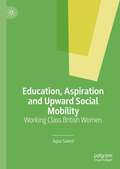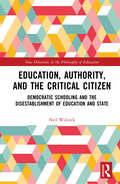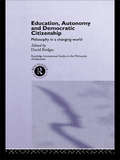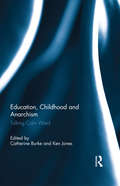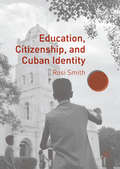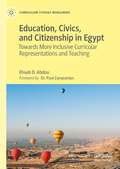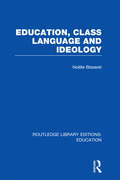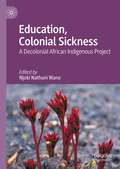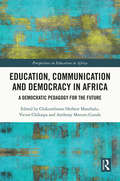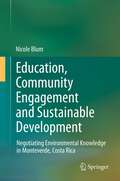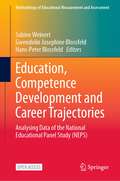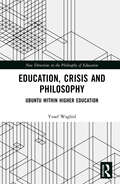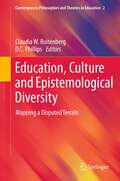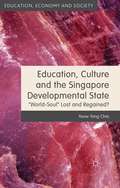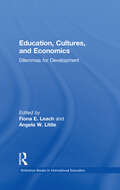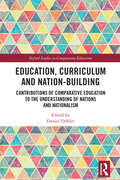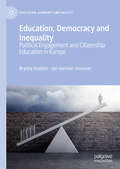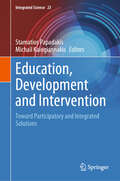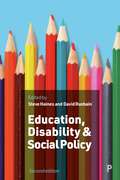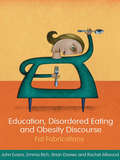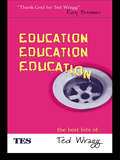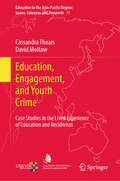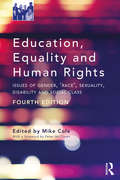- Table View
- List View
Education, Aspiration and Upward Social Mobility: Working Class British Women
by Aqsa SaeedThis book explores the career aspirations, achievements and consequent social mobility of a group of British Pakistani women. It uses Bourdieu’s concept of cultural capital to analyse how these women, living in a segregated Pakistani community located in a deprived northern town in the UK with poor employment opportunities, acquired the resources to pursue further and higher education, obtain qualifications and enter professional careers. The author discusses and analyses how cultural capital features in homes, schools and workplaces, as well as how the women navigate and modify intersecting gender, ethnic and class identities in order to create specific career trajectories. Illuminating the rich intersections of biography, history and society, the author captures important qualitative data which acts as a microcosm for contemporary discussions on social mobility, multiculturalism, Muslim communities, race, and gender in Britain.
Education, Authority, and the Critical Citizen: Democratic Schooling and the Disestablishment of Education and State (New Directions in the Philosophy of Education)
by Neil WilcockThis book offers a unique analysis of the tension between the individual and society in educational contexts, and the role that citizenship and democratic education can play. It approaches the question from two different perspectives – the institutional and the interactional – and argues that any solution must answer the tension from both or it will necessarily fail. The answer is found through a political methodology that places education at the centre and concludes that a balance can be found if we embrace the federated disestablishment of education and state and internally democratic schooling that aims to realise the emancipation of the political child. The book situates itself in the tradition of political philosophy that is education focused, identifying an unresolved tension between the individual and society in the works of Rousseau, Dewey, and Freire. It discusses the concept of authority as a primary issue persisting in this tension. It does so by exploring both interactional and institutional responses based on the idea of the free individual and cooperative associations. The author advocates an education system that creates the necessary space for the cultivation of the free individual and is run by the principles of internally democratic schooling. With a strong focus on citizenship and the role of education in the development of social justice-oriented citizens, this book will be of great interest to researchers, academics, and postgraduate students in the fields of philosophy of education, political philosophy, educational theory, and citizenship education.
Education, Autonomy and Democratic Citizenship: Philosophy in a Changing World (Routledge International Studies in the Philosophy of Education #No.2)
by David BridgesFirst Published in 2004. Routledge is an imprint of Taylor & Francis, an informa company.
Education, Childhood and Anarchism: Talking Colin Ward
by Ken Jones Catherine BurkeAs one of Britain's most original thinkers and writers Colin Ward wrote extensively about positive and practical examples from the past and present of the anarchist spirit or the 'social principle' in everyday life. This volume is the first scholarly work dedicated to examining the significance of his distinctive and highly relevant contributions to the areas of education, children and the environment. In each chapter, international contributors from academic and activist backgrounds offer cross-disciplinary and critical perspectives on Ward's work and its relevance to contemporary debates. The book is divided into four key areas: The Sand Box of the City Adventures in Education Reflections on Practice Mobilisations. This book will appeal to academics and professionals interested in the condition of childhood and youth today. It will prove useful for postgraduates and professionals undertaking further professional development, and is relevant to anyone studying, researching or working in fields relating to children, education and the environment not just in the UK but beyond.
Education, Citizenship, and Cuban Identity
by Rosi SmithThis book explores how Cuba's famously successful and inclusive education system has formed young Cubans' political, social, and moral identities in a country transfigured by new inequalities and moral compromises made in the name of survival. The author examines this educational experience from the perspective of those who grew up in the years of economic crisis following the fall of the Soviet Union, charting their ideals, their frustrations and their struggle to reconcile revolutionary rhetoric with twenty-first century reality.
Education, Civics, and Citizenship in Egypt: Towards More Inclusive Curricular Representations and Teaching (Curriculum Studies Worldwide)
by Ehaab D. AbdouThis book explores how to render curricular representations more inclusive and how individuals’ interactions with competing historical narratives and discourses shape their civic attitudes and intergroup dynamics. Based on ethnographic research in the Egyptian context, it offers insights for curriculum developers, teacher educators, and teachers interested in the development of critical citizens who are able to engage with multiple narratives and perspectives. Drawing on theorizations of historical consciousness, critical pedagogy, and critical discourse analysis, it demonstrates the need for more nuanced and holistic analytical frameworks and pedagogical tools. Further, it offers insights towards building such analytical and pedagogical approaches to help gain a deeper understanding of connections between students’ historical consciousness tendencies and their civic engagement as citizens.
Education, Class Language and Ideology (Routledge Library Editions: Education)
by Noelle BisseretThis book presents an analysis of the ‘essentialist ideology’, which is inherent to class-based societies. The author argues that essentialist ideology is efficient through its unconscious component and is imposed on everyone. It guides school selection and imposes on each class a language specific in its reference to concrete domination relations. It even unbalances the scientific objectivity of researchers in the social sciences, not only among those who abide by the theory of natural aptitudes, but also among its sharpest critics, such as Basil Bernstein, Pierre Bourdieu and J C Passeron, whose work is considered in this book.
Education, Colonial Sickness: A Decolonial African Indigenous Project
by Njoki Nathani WaneIn the last two decades, we have witnessed the quest for decolonization; through research, writing, teaching, and curriculum across the globe. Calls to decolonize higher education have been overwhelming in recent year. However, the goal of decolonizing has evolved past not only the need to dismantle colonial empires but all imperial structures. Today, decolonization is deemed a basis for restorative justice under the lens of the psychological, economic, and cultural spectrum. In this book, the editor and her authors confront various dimensions of decolonizing work, structural, epistemic, personal, and relational, which are entangled and equally necessary. This book illuminates other sites and dimensions of decolonizing not only from Africa but also other areas. This convergence of critical scholarship, theoretical inquiry, and empirical research is committed to questioning and redressing inequality in contemporary history and other African studies. It signals one of many steps in a bid to consultatively examine how knowledge and power have been both defined and subsequently denied through the sphere of academic practice.
Education, Communication and Democracy in Africa: A Democratic Pedagogy for the Future (Perspectives on Education in Africa)
by Chikumbutso Herbert ManthaluThis innovative volume critically examines the intersection between democracy, education and communication in African educational domains. Providing a platform for multidisciplinary research, it advances scholarship in democratic citizenship education in African higher education through methodological and theoretical innovation. The book discusses the extent to which explicit or subtle communication frameworks that underlie policymaking, institutional culture, teaching and learning experiences in African higher education significantly engender democratic mind habits and practices in students as citizens. Chapters in the book examine how communication frameworks in pedagogy ought to navigate power imbalances between students on the one hand and the institution and academics on the other. The book also examines how (dis)empowering higher education policies are and whether they contribute to democratic equality. This book will be of great interest to academics, researchers and post-graduate students in the fields of education, democratic citizenship education, communication, and African studies.
Education, Community Engagement and Sustainable Development
by Nicole BlumA growing body of research has given critical attention to diverse theories and practices of environmental education, and its potential contribution to addressing pressing global issues such as sustainable development and climate change. While much of this work has focused on perspectives and practices in Europe and North America, this book explores environmental learning within formal education, in programmes by non-governmental organisations, and in public education spaces in Monteverde, Costa Rica. The discussion also highlights the need for more research to understand the broader social and economic interactions between such efforts and the communities in which they are located.
Education, Competence Development and Career Trajectories: Analysing Data of the National Educational Panel Study (NEPS) (Methodology of Educational Measurement and Assessment)
by Hans-Peter Blossfeld Sabine Weinert Gwendolin Josephine BlossfeldThis Open Access book presents the results of an interdisciplinary research program to utilize data from the multicohort German National Educational Panel Study (NEPS), which included over 100.000 participants in six nationally representative panel studies. Renowned researchers from the fields of sociology, psychology, educational science, economics, and survey methodology have used the (longitudinal) data for their substantive and/or methodological questions and present important results of their research projects. This edited volume contains contributions from the following four topics: (1) Competence Development: Individual Characteristics, Learning Environments, and other Contextual Factors, (2) Educational Transitions and Pathways: Influencing Factors and Outcomes, (3) Vocational Training and Labour Market, and (4) Individuals with Migration Background. It provides essential insights for researchers, postdocs, PhD students, and university students of different scientific disciplines interested in educational sciences as well as for policy makers who have to deal with educational problems in modern societies.
Education, Conservatism, and the Rise of a Pedagogical Elite in Colombian Panama: 1878-1903
by Rolando de la Guardia WaldThis book historically reconstructs the conservative and moderate liberals’ views on governance, morality, and education within the context of La Regeneración (1878-1903) in Colombian Panama. de la Guardia Wald explores the way political theories and ideologies, especially conservatism and positivism, shaped late nineteenth-century Panamanian pedagogues’ conceptualizations of proper education for the sake of social regeneration. By demonstrating that Isthmian political and pedagogical debates went beyond the preoccupation for the realisation of classic liberalism and exploitation of Panama’s geographical views, this book challenges the perspective that Panamanian identity was a fabrication of the United States. Instead, this study reveals that the combination of positivist and conservative understandings of morality, reason, and good science defined governmental policies intended to recuperate and enhance civic values and nationalism, leading the way to progress and modernity.
Education, Creativity, and Economic Empowerment in Africa
by Toyin Falola Jamaine AbidogunEducation and the arts offer multiple, mutually clarifying lenses through which to examine and understand issues of poverty and empowerment. Here, both are combined in a fascinating look at how these two often overlooked elements promote social equality and cultivate personal agency across Africa's diverse political-economic landscapes.
Education, Crisis and Philosophy: Ubuntu within Higher Education (New Directions in the Philosophy of Education)
by Yusef WaghidThis book brings together a discussion of educational philosophy, nihilism and humanity to rethink education in times of crisis, with a particular focus on teaching and learning in universities. The book argues that an educational crisis manifests when the value of academic institutions come under attack, looking closely at how higher education practices have been devalued. The book is situated in the context of three intertwined crises; the coronavirus pandemic, economic decline resulting in poverty and unemployment, and the crisis of human migration. It questions what the role of education is, or ought to be, in times of crisis and how our humanity ought to be cultivated during such turbulent times. This novel and timely text will be of great interest to researchers, academics and postgraduate students in the fields of educational philosophy, higher education and international education.
Education, Culture and Epistemological Diversity
by Claudia W. Ruitenberg D. C. PhillipsIn the recent educational research literature, it has been asserted that ethnic or cultural groups have their own distinctive epistemologies, and that these have been given short shrift by the dominant social group. Educational research, then, is pursued within a framework that embodies assumptions about knowledge and knowledge production that reflect the interests and historical traditions of this dominant group. In such arguments, however, some relevant philosophical issues remain unresolved, such as what claims about culturally distinctive epistemologies mean, precisely, and how they relate to traditional epistemological distinctions between beliefs and knowledge. Furthermore, can these ways of establishing knowledge stand up to critical scrutiny? This volume marshals a variety of resources to pursue such open questions in a lively and accessible way: a critical literature review, analyses from philosophers of education who have different positions on the key issues, a roundtable discussion, and interactions between the two editors, who sometimes disagree. It also employs the work of prominent feminist epistemologists who have investigated parallel issues with sophistication. This volume does not settle the question of culturally distinctive epistemologies, but teases out the various philosophical, sociological and political aspects of the issue so that the debate can continue with greater clarity.
Education, Culture and the Singapore Developmental State
by Yeow-Tong ChiaThis book explores the role of education in the formation of the Singapore developmental state. The book provides a historical study of citizenship education in Singapore, whereby a comparative study of history, civics and social studies curricula, and the politics and policies that underpin them are examined.
Education, Cultures, and Economics: Dilemmas for Development (Reference Books in International Education #48)
by Angela W. Little Fiona E. LeachThis edited volume reviews the conflict between economic prescriptions for improved education in the developing world and local cultures. Among the issues reviewed are: conceptions of culture and economics in development and education literature, economic considerations of school systems to promote cultural goals, the differentiation of schools from other sites of cultural reproduction, learning experiences of various cultural groups, and the cross-cultural work of development agencies.
Education, Curriculum and Nation-Building: Contributions of Comparative Education to the Understanding of Nations and Nationalism (Oxford Studies in Comparative Education)
by Daniel TröhlerContributing to interdisciplinary discussions on nationalism, the book explores how educational systems and practices contribute to the phenomena of nationalism and nation-building. Using nine comparative case studies from four continents, the book elaborates a theoretical understanding of nationalism from the perspectives of comparative education research. It integrates the theme of nation, nation-building and nationalism and its involvement with issues of education. It explores the theoretical scope of concepts such as national identities, national literacies, or "doing" nation. The book revives the idea that nation should be the starting point of comparative research and contributes to the theoretically reflective integration of nationalism research into education research. This timely book will be highly relevant for researchers, academics, and postgraduate students in the fields of comparative education, international education, education policy, and curriculum studies.
Education, Democracy and Inequality: Political Engagement and Citizenship Education in Europe (Education, Economy and Society)
by Jan Germen Janmaat Bryony HoskinsThis book posits that national education systems are enhancing socioeconomic inequalities in political engagement. While the democratic ideal is social equality in political engagement, the authors demonstrate that the English education system is recreating and enhancing entrenched democratic inequalities. In Europe, the UK has the strongest correlation between social background and voting behaviours. Examining the role of the school and the education system in the potential reproduction of these inequalities, the authors draw upon the theories of Bourdieu and Bernstein and compare the English school system to other European countries to analyse barriers that are put along the way to political engagement. In times of political disaffection, frustration and polarisation, it is particularly important to uncover why young people from disadvantaged backgrounds are less likely to engage politically, and to help inspire future generations to use their voice. This timely book will be of interest and value to students and scholars of educational inequality and political engagement.
Education, Development and Intervention: Toward Participatory and Integrated Solutions (Integrated Science #23)
by Stamatios Papadakis Michail KalogiannakisThis book explores integrated education and learning, with a focus on new approaches such as artificial intelligence and ChatGPT. It provides insight into educational techniques that promote critical thinking and enhance learning skills. It covers various mechanisms that influence this link, including meta-cognitive capacity, memory, cognitive style, conceptual approaches, digitization, teaching approaches, echoing, and questioning. This discussion spans all levels, from early childhood to higher education. Additionally, it provides pedagogical tips on creating a learning environment that encourages pupils' creativity and critical thinking, both online and in the classroom. It demonstrates how an integrated approach to education can create high-quality minds and promote modern values to meet current and future challenges. Undergraduate and postgraduate students, early childhood teachers and educators, as well as academic faculty can benefit from its contents as it presents valuable perspectives, both practical and theoretical, that enrich the current STEM, robotics, and mobile apps education agenda.
Education, Disability and Social Policy
by Steve Haines and David RuebainEducational opportunities for disabled children remain a vital contemporary issue in British social policy. This new edition of the milestone book Education, Disability and Social Policy outlines critical debates in education concerning the position and experiences of disabled children and young people within a contemporary policy context. Incorporating new voices from leading thinkers, this second edition includes a fresh introduction and updates to key chapters, including whether the Children and Families Act (2014) resolved tensions between parents and local authorities over resources, and proposals for a whole-school, strengths-based approach to social, emotional and mental health difficulties. In addition, it includes a new discussion on the intersection of race and disability.
Education, Disordered Eating and Obesity Discourse: Fat Fabrications
by Brian Davies John Evans Emma Rich Rachel AllwoodEating less, exercising more and losing weight seem the obvious solution for the oncoming 'obesity epidemic'. Rarely, however, is thought given to how these messages are interpreted and whether they are in fact inherently healthy. Education, Disordered Eating and Obesity Discourse investigates how 'body centred talk' about weight, fat, food and exercise is recycled in schools, enters educational processes, and impacts on the identities and health of young people. Drawing on the experiences of young women who have developed eating disorders and research on international school curricula and the media, the authors challenge the veracity, substance and merits of contemporary 'obesity discourse'. By concentrating on previously unexplored aspects of the debate around weight and health, it is revealed how well-meaning advice can propel some children toward behaviour that seriously damages their health. This book is not only about 'eating disorders' and the people affected, but the effects of obesity discourse on everyone’s health as it enters public policy, educational practice and the cultural fabric of our lives. It will interest students, teachers, doctors, health professionals and researchers concerned with obesity and weight issues.
Education, Education, Education: The Best Bits of Ted Wragg
by E. C. WraggWhen New Labour came into office in 1997, its commitment to 'education, education, education' captured the imagination of the public. This collection of humorous articles by Ted Wragg between 1998 to 2003 exposes the real state of education during this period, when educational policy was never far from the headlines. No one escapes Ted's sharp-shooting wit: from the 'blamers and shamers' who try to turn teacher-bashing into a national pastime to the 'pale policy wonks' in the Department of Education, who issue regular hare-brained initiatives from the mysterious 'Tony Zoffis'. Split into seven issue-focused chapters, this hilarious collection will be a tonic for anyone finding themselves unsure whether to laugh or cry about recent developments in the world of education.
Education, Engagement, and Youth Crime: Case Studies in the Lived Experience of Education and Recidivism (Education in the Asia-Pacific Region: Issues, Concerns and Prospects #71)
by Cassandra Thoars David MoltowThis book presents insights into how affective educational experiences may be associated with youth criminal behaviour and the pathway to recidivism. It explores the perspectives and lived school experiences of five young adult male prison inmates, including while they were incarcerated as youths. Through these case studies, the book explores the relationship between affective engagement in education and recidivism.This book shows that participants were affectively disengaged from education prior to their initial incarceration in a youth detention facility, and that their disaffection before, during, and after youth incarceration both generated and impacted on their cognitive and behavioural disengagement from education. Moreover, a range of additional factors not directly causally related to their schooling were shown to have had a significant effect on their engagement in education. The book considers a number of key findings. First, the foundational role that a sense of belonging plays in how young people experience education and its relation to crime. Second, the importance of individualized transition plans for youth at risk, and youth offenders before, during, and after incarceration. Third, the extent to which successful transition from youth offending and recidivism hinges on interagency collaboration. This book will be beneficial to teacher educators, education researchers, criminologists and sociologists.
Education, Equality and Human Rights: Issues of Gender, 'Race', Sexuality, Disability and Social Class
by Mike ColeThe fourth edition of Education, Equality and Human Rights has been fully updated to reflect the economic, political, social and cultural changes in educational and political policy and practice, as austerity continues and in the light of the EU referendum. Written by a carefully selected group of experts, each of the five equality issues of gender, ‘race’, sexuality, disability and social class are covered as areas in their own right as well as in relation to education. Key issues explored include: human rights, equality and education women and equality, historically and now gender and education perspectives throughout time racism in the UK from the Empire to the present racism and education from imperial times to the May government the making and remaking of sexualities the challenges surrounding teaching and learning about sexuality in schools the struggle for disability equality inclusive education social class, Marxism and socialism social class inequality and education. With an uncompromising and rigorous analysis of education and human rights and a foreword from Professor Peter McClaren, Education, Equality and Human Rights is an essential resource across a wide range of disciplines and for all those interested in education, social policy and human rights.
